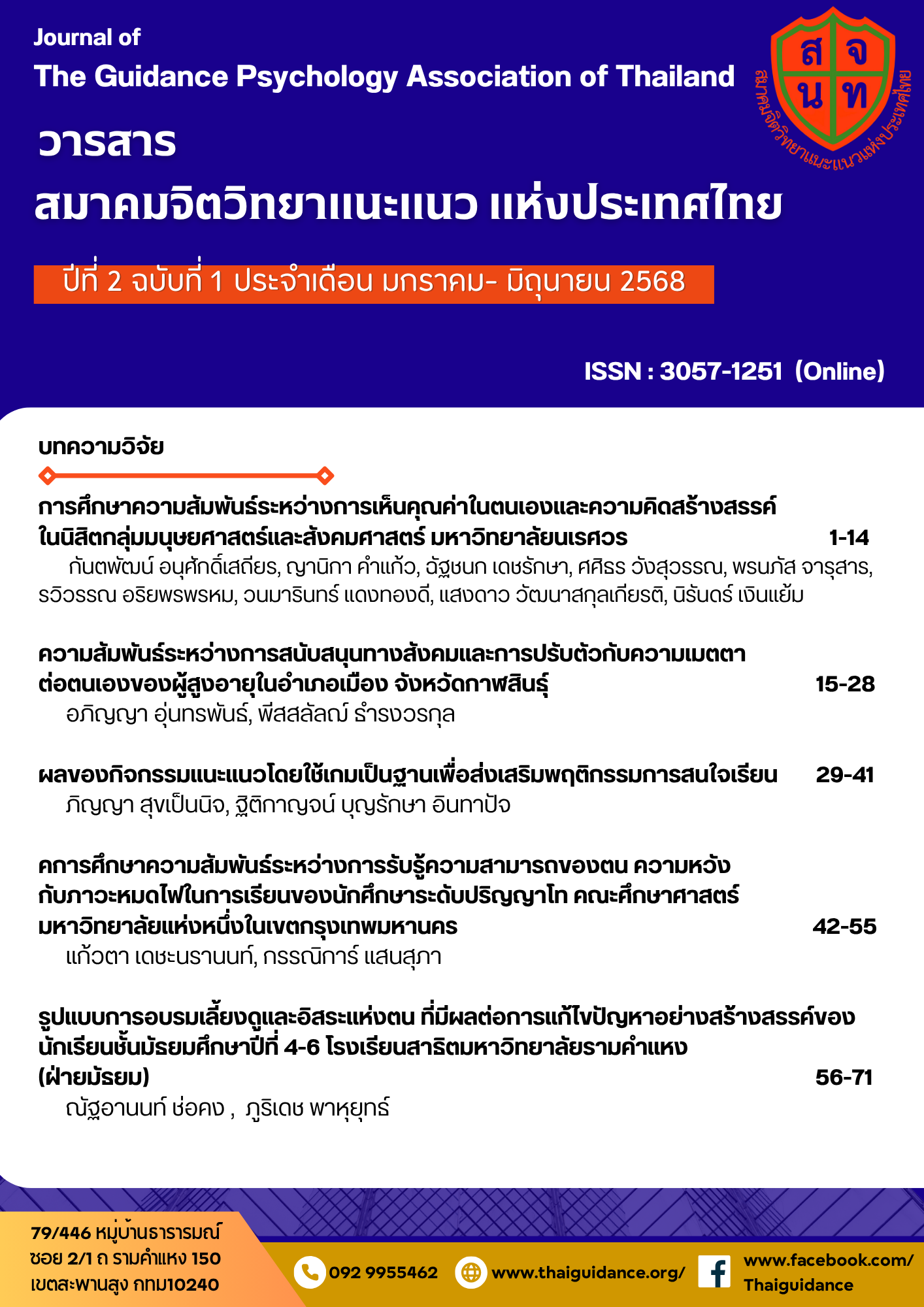Parenting Style and Self -Autonomy toward the Creative Problem Solving among Secondary 4 – 6 students in The Demonstration School of Ramkhamhaeng University (Secondary)
Keywords:
รูปแบบการอบรมเลี้ยงดู, อิสระแห่งตน, การแก้ไขปัญหาอย่างสร้างสรรค์Abstract
The objectives of this research were to: 1) study the parenting styles, self-autonomy levels, and creative problem-solving skills of students in grades 10-12 at the Demonstration School of Ramkhamhaeng University (Secondary Level); 2) examine the relationships between these factors; and 3) assess the influence of parenting styles and self-autonomy on students' creative problem-solving skills. The research used a demographic questionnaire, a parenting style questionnaire, an autonomy scale, and a creative problem-solving scale. Data were analyzed using Pearson's Correlation Coefficient to analyzed relationships, and multiple regression analysis was conducted to assess the influence of parenting styles and self-autonomy on creative problem-solving, with a significance level set at 0.05. The results showed that: 1) The "Authoritative" parenting style was the most prevalent (mean = 3.60, SD = 0.94); self-autonomy and creative problem-solving were both at moderate levels (means = 3.34 and 3.45, respectively); 2) Uninvolved parenting style was the only varible which wasn’t correrate with creative provlem-solving. ;3) The Authoritarian parenting style, self-autonomy, behavioral self-autonomy, and cognitive self-autonomy all significantly influenced creative problem-solving. The regression analysis indicated that creative problem-solving was positively influenced by autonomy and the controlling parenting style, with the following equations: Creative Problem-Solving (Y) = -0.487 + 0.107 (Authoritarian Parenting Style) + 1.175 (Autonomy) and Creative Problem-Solving (Z) = 0.795 (Authoritarian Parenting Style + Autonomy)
References
เสรี ใหม่จันทร์. (2553). การวิเคราะห์องค์ประกอบและการเสริมสร้างอิสระแห่งตนของนักเรียนวัยรุ่น โดยการให้คำปรึกษากลุ่ม (ปริญญาการศึกษาดุษฎีบัณฑิต). กรุงเทพฯ: มหาวิทยาลัยศรีนครินทร์วิโรฒ.
สำนักงานสภาพัฒนาการเศรษฐกิจและสังคมแห่งชาติ. (2565 ). แผนพัฒนาเศรษฐกิจและสังคมแห่งชาติ ฉบับที่ 13 (พ.ศ. 2566—2570). ราชกิจจานุเบกษา. 143. https://www.ratchakitcha.soc.go.th/DATA/PDF/2565/E/258/T_0001.PDF
พรรณทิพย์ ศิริวรรณบุศย์, ธีระพร อุวรรณโณ, เพ็ญพิไล ฤทธาคณานนท์ และคณะ (2545). การศึกษารูปแบบ ความสัมพันธ์ระหว่างพฤติกรรมของคนไทยกับกระบวนการทางสังคมประกิตของครอบครัวในปัจจุบันที่เอื้อต่อการพัฒนาประเทศ. กรุงเทพฯ: จุฬาลงกรณ์มหาวิทยาลัย.
Baumrind, D. (1971). Current patterns of parental authority. Developmental Psychology, 4(1, Pt.2), 1–103. https://doi.org/10.1037/h0030372
Beckert, T. E. (2005). Fostering Autonomy in Adolescents: A Model of Cognitive Autonomy and Self-evaluation. Utah State University [Paper presented at the American Association of Behavioral and Social Sciences].
Dworkin, G. (1988). The Theory and Practice of Autonomy. Cambridge, UK: Cambridge University Press. http://dx.doi.org/10.1017/CBO9780511625206
Fernando, S., Ileana, M., Andre, W., et al., (2013). Learning from Failure: A Case Study on Creative Problem Solving. Procedia-Social and Behavioral Sciences, 75, 570-580. https://doi.org/10.1016/j.sbspro.2013.04.062
Hashem, W. A. A., Abdelaziz, E. M., Mohammed, S., et al., (2024). Problem Solving Skills and Its Relation to Parental Authority Among Technical Secondary Schools Students. Menoufia Nursing Journal Faculty of Nursing Menoufia University, 9(1), 277-291. https://doi.org/10.21608/MENJ.2024.354765
Khanum, S., Mushtaq, R., Kamal, M. D., et al., (2023). The Influence of Parenting Styles on Child Development. Journal of Policy Research, 9(2), 808–816. https://doi.org/10.61506/02.00022
Mehrinejad, S. A., Rajabimoghadam, S., & Tarsafi, M. (2015). The Relationship between Parenting Styles and Creativity and the Predictability of Creativity by Parenting Styles. Procedia - Social and Behavioral Sciences, (205), 56-60. https://doi.org/10.1016/j.sbspro.2015.09.014
Mele, A. R. (2001). Autonomous Agents: From Self-Control to Autonomy. Oxford: Oxford University Press. https://doi.org/10.1093/0195150430.001.0001.
Noom, M. J. (1999). Adolescent Autonomy: Characteristics and Correlates [Thesis]. Delft: Eburon Publishers.
Noom, M. J., Dekovic, M., & Meeus, W. H. (2001). Conceptual Analysis and Measurement of Adolescent Autonomy. Journal of Youth and Adolescence., 30(5), 577-595. https://doi.org/10.1023/A:1010400721676
Önder, A., & Gülay, H. (2009). Reliability and validity of parenting styles and dimensions questionnaire. Procedia - Social and Behavioral Sciences, 1(1), 508-514. https://doi.org/10.1016/j.sbspro.2009.01.092
Perry, N. B., Dollar, J. M., Calkins, S. D., et al. (2018). Childhood Self-Regulation as a Mechanism Through Which Early Overcontrolling Parenting Is Associated with Adjustment in Preadolescence. American Psychological Association, 54(8), 1542–1554. https://doi.org/http://dx.doi.org/10.1037/dev0000536
Russell, S., & Bakken, R. J. (n.d.). Development of Autonomy in Adolescence. Basicknowledge101.https://www.basicknowledge101.com/pdf/Development%20of%20Autonomy%20in%20Adolescence.pdf.
Ryan, R. M., & Deci, E. L. (2006). Self-regulation and the problem of human autonomy: Does psychology need choice, self-determination, and will. Journal of Personality, 74(6), 1557-1586. https://doi.org/10.1111/j.1467-6494.2006.00420.x
Salam, A., & Miriam, S. (2018). Teaching Problem-solving Skills Through Learner Autonomy Based Learning and Local Wisdom Insight. Advances in Social Science, Education and Humanities Research (ASSEHR), 147. https://doi.org/10.2991/icsse-17.2018.1
Schroeder, R. D., Bulanda, R. E., Giordano, P. C., et al. (2010). Parenting and adult criminality: An examination of direct and indirect effects by race. Journal of Adolescent Research, 25(1), 64–98. https://doi.org/10.1177/0743558409354215
Treffinger, D. J. (1995). Creative Problem Solving: Overview of education implications. Education Psychology Review, 7(3), 301 –312. https://doi.org/10.1007/BF02213375
Treffinger, D. J., & Isaksen, S. G. (2005). Creative Problem Solving: The History, Development, and Implications for Gifted Education and Talent Development. Gifted Child Quarterly, 49(4), 342 –353. https://doi.org/10.1177/001698620504900407.
Treffinger, D. J., Isaksen, S. G., & Dorval, B. (2005). Creative Problem Solving: An Introduction (4th ed.). Prufrock Press Inc.
Downloads
Published
How to Cite
Issue
Section
License
Copyright (c) 2025 (The Guidance Psychology Association of Thailand

This work is licensed under a Creative Commons Attribution-NonCommercial-NoDerivatives 4.0 International License.
บทความที่ได้รับการตีพิมพ์เป็นลิขสิทธิ์ของ สมาคมจิตวิทยาแนะแนวแห่งประเทศไทย
ข้อความที่ปรากฏในบทความแต่ละเรื่องในวารสารวิชาการเล่มนี้เป็นความคิดเห็นส่วนตัวของผู้เขียนแต่ละท่านไม่เกี่ยวข้องกับสมาคมจิตวิทยาแนะแนวแห่งประเทศไทย และบุคลากรท่านอื่น ๆ ใน สมาคมฯ แต่อย่างใด ความรับผิดชอบองค์ประกอบทั้งหมดของบทความแต่ละเรื่องเป็นของผู้เขียนแต่ละท่าน หากมีความผิดพลาดใดๆ ผู้เขียนแต่ละท่านจะรับผิดชอบบทความของตนเองแต่ผู้เดียว



